- Home
- »
- Advanced Interior Materials
- »
-
Carbon Aerogels Market Size & Share, Industry Report, 2030GVR Report cover
![Carbon Aerogels Market Size, Share & Trends Report]()
Carbon Aerogels Market (2025 - 2030) Size, Share & Trends Analysis Report By Form (Blanket, Particle, Panel, Monolith), By End-use (Oil & Gas, Building & Construction, Automotive, Aerospace & Marine, Performance Coatings), By Region, And Segment Forecasts
- Report ID: GVR-4-68040-538-8
- Number of Report Pages: 101
- Format: PDF
- Historical Range: 2018 - 2023
- Forecast Period: 2025 - 2030
- Industry: Advanced Materials
- Report Summary
- Table of Contents
- Segmentation
- Methodology
- Download FREE Sample
-
Download Sample Report
Carbon Aerogels Market Size & Trends
The global carbon aerogels market size was estimated at USD 105.0 million in 2024 and is expected to grow at a CAGR of 20.2% from 2025 to 2030. The increasing demand for high-performance energy storage solutions is a significant driver of the global carbon aerogels industry. Carbon aerogels exhibit exceptional electrical conductivity, high surface area, and ultra-low density, making them ideal for applications in supercapacitors and advanced batteries. With the rising adoption of electric vehicles (EVs) and renewable energy storage systems, manufacturers are focusing on developing efficient energy storage technologies, further boosting the demand for carbon aerogels in the industry.
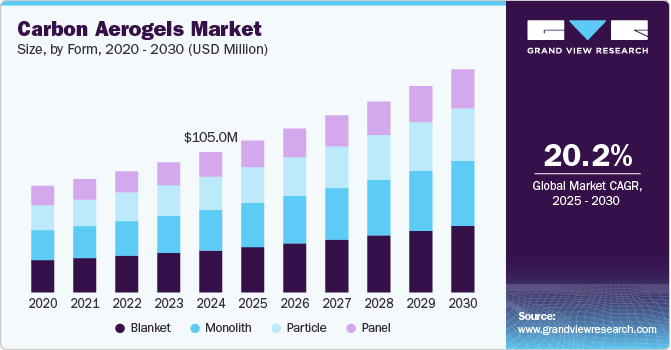
The rapid expansion of the aerospace and defense sector is another key factor driving the carbon aerogels industry. Their lightweight structure, excellent thermal insulation properties, and superior mechanical strength make them highly suitable for spacecraft, aircraft, and defense equipment. As governments and private organizations invest heavily in space exploration and next-generation defense systems, the demand for carbon aerogels continues to grow, driven by their ability to enhance fuel efficiency and thermal stability in extreme environments.
The growing need for advanced filtration and adsorption materials is also driving the market growth. Carbon aerogels possess a highly porous structure that allows them to act as efficient adsorbents for removing contaminants from air and water. With increasing concerns over environmental pollution and stricter regulations on Oil & Gas emissions, industries such as wastewater treatment, chemical processing, and gas purification are adopting carbon aerogels to enhance filtration efficiency. This trend is expected to accelerate further as sustainability and clean energy initiatives gain momentum worldwide.
Market Concentration & Characteristics
The market is characterized by a high degree of innovation, driven by advancements in nanotechnology and material science. Carbon aerogels, known for their exceptional porosity, lightweight structure, and thermal stability, are witnessing continuous research and development efforts to enhance their performance across industries such as energy storage, environmental remediation, and aerospace. Companies are increasingly investing in novel Formion techniques to improve cost-efficiency and scalability, making carbon aerogels more accessible for commercial applications. The market is also marked by a steady pace of mergers and acquisitions, as key players seek to expand their technological capabilities and market reach. Strategic collaborations between material manufacturers and end-user industries are further fostering innovation, enabling the development of customized solutions tailored to specific Oil & Gas needs.
Regulatory policies play a significant role in shaping the market dynamics of carbon aerogels, particularly in industries like energy storage, aerospace, and environmental sustainability. Governments across regions are enforcing stricter environmental regulations, pushing for materials with superior energy efficiency and reduced environmental impact, which has increased the demand for carbon aerogels in applications such as supercapacitors and advanced filtration systems.
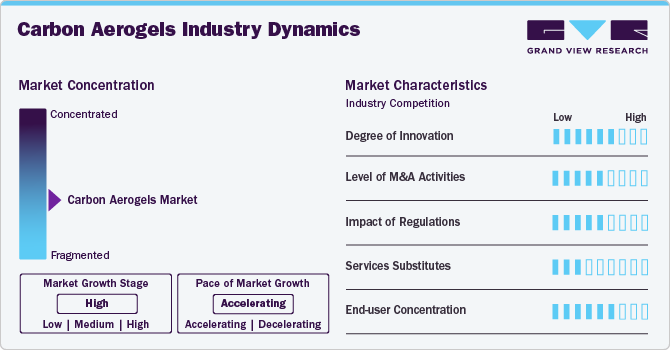
While carbon aerogels offer unique advantages, they face competition from service substitutes like silica aerogels and polymer-based alternatives, which can sometimes provide cost-effective solutions with comparable performance. Additionally, end-user concentration remains high in sectors such as energy storage and defense, where the need for high-performance, lightweight materials is critical. However, as Formion costs decrease and new applications emerge, carbon aerogels are expected to penetrate a broader range of industries, further diversifying their market presence.
Form Insights
The blanket segment led the market and accounted for the largest revenue share of 57.53% in 2024, driven by its superior thermal insulation, lightweight properties, and flexibility. Carbon aerogel blankets are widely used in industries such as aerospace, automotive, energy, and construction, where high-performance insulation is essential. Their ability to provide excellent thermal resistance while maintaining minimal weight makes them ideal for applications in spacecraft, fuel cells, and high-temperature Oil & Gas processes.
The panel segment is expected to grow at fastest CAGR of 28.6% over the forecast period, due to the increasing demand for lightweight, high-performance materials in various applications, such as aerospace, automotive, and construction. Carbon aerogel panels offer superior thermal insulation, high surface area, and excellent strength-to-weight ratios, making them ideal for use in environments where performance and durability are critical. In the aerospace industry, for instance, the demand for lightweight, heat-resistant materials for spacecraft and aircraft components is driving the adoption of carbon aerogel panels.
End-use Insights
The oil & gas segment dominated the market and accounted for the largest revenue share of 61.0% in 2024. driven by the increasing demand for advanced materials with high thermal insulation, lightweight properties, and enhanced performance characteristics in energy-related applications. Carbon aerogels, known for their unique porous structure and excellent thermal conductivity, are being increasingly adopted in oil and gas operations to provide superior insulation for pipelines, vessels, and storage tanks.
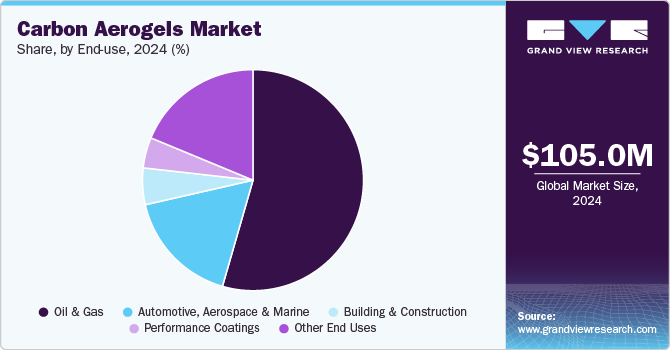
Performance coatings segment is expected to grow significantly at CAGR of 21.6% over the forecast period, driven by the increasing demand for high-performance materials in various industries, including automotive, aerospace, and electronics. Carbon aerogels, known for their low density, high surface area, and exceptional thermal and electrical conductivity, are ideal for performance coatings that require enhanced properties. As industries seek materials that offer superior protection against high temperatures, corrosion, and wear, carbon aerogels are becoming a preferred choice for coating applications, particularly in extreme environments.
Regional Insights
The rise of nanotechnology and material science research in North America is fueling advancements in carbon aerogels. Leading universities and research institutions in the U.S. and Canada are exploring innovative ways to enhance the performance and scalability of carbon aerogel Formion. Government grants and funding initiatives for nanomaterials research have further supported the development of advanced carbon aerogel applications, ranging from biomedical devices to fuel cell technologies. As breakthroughs in nanotechnology continue, the market for carbon aerogels is expected to expand significantly.
U.S. Carbon Aerogels Market Trends
The increasing focus on water purification and environmental remediation is creating new opportunities for carbon aerogels in the U.S. market. Their exceptional adsorption capabilities make them highly effective in removing heavy metals, oil spills, and other pollutants from water sources. As environmental concerns and regulations tighten, industries and municipalities are adopting advanced filtration technologies, further propelling the demand for carbon aerogels.
Asia Pacific Carbon Aerogels Market Trends
Asia Pacific dominated the market and accounted for the largest revenue share of 31.56% in 2024. The Asia Pacific carbon aerogels market is experiencing significant growth due to the rising demand for high-performance materials in energy storage applications. Carbon aerogels, known for their ultra-lightweight structure and high conductivity, are increasingly being utilized in supercapacitors and lithium-ion batteries to enhance energy efficiency and storage capacity. As governments across the region push for clean energy solutions and electric vehicle (EV) adoption, the need for advanced energy storage materials is driving the expansion of the market.
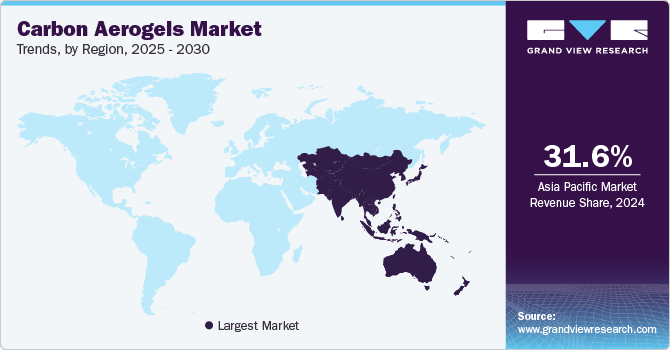
The China carbon aerogels market is experiencing significant growth, driven by the country's increasing investments in advanced materials research and development. The government's strong push for technological innovation and Oil & Gas modernization under initiatives like "Made in China 2025" has encouraged domestic companies and research institutions to focus on the development of high-performance materials, including carbon aerogels. This has led to the establishment of new Formion facilities and the scaling up of manufacturing processes, making carbon aerogels more commercially viable and accessible for various industries.
Europe Carbon Aerogels Market Trends
The increasing demand for advanced energy storage solutions is a key driver of the carbon aerogels market in Europe. With the rise of electric vehicles (EVs) and renewable energy sources, there is a growing need for high-performance supercapacitors and batteries. Carbon aerogels, known for their high surface area and excellent conductivity, are increasingly being utilized in energy storage applications, enhancing efficiency and longevity. This trend is further supported by stringent European Union (EU) policies promoting sustainable energy alternatives.
The aerospace and defense sectors in Germany are contributing significantly to the increasing demand for carbon aerogels. These industries require materials that offer superior strength, lightweight properties, and thermal resistance. Carbon aerogels, with their unique characteristics, are being integrated into next-generation aircraft and defense equipment, enhancing fuel efficiency and performance. The German government’s continued investment in aerospace research and development is expected to further boost the adoption of carbon aerogels in this sector.
Latin America Carbon Aerogels Market Trends
The electronics and semiconductor industries are increasingly utilizing carbon aerogels for their exceptional electrical conductivity and heat dissipation properties. As demand for compact and high-performance electronic devices rises, carbon aerogels are being integrated into microelectronics, sensors, and flexible circuits. This trend is expected to support the growth of the market in Latin America’s expanding technology sector. Latin America's oil and gas industry is also contributing to the rising demand for carbon aerogels. These materials are used in thermal insulation systems for pipelines, storage tanks, and offshore structures, helping to enhance energy efficiency and reduce operational costs. As the region continues to invest in oil and gas exploration, the need for advanced insulation solutions is expected to boost market growth.
Middle East & Africa Carbon Aerogels Market Trends
The expansion of research and development activities in the region is playing a crucial role in the market’s growth. Universities and research institutions are actively exploring new applications of carbon aerogels, particularly in energy storage, environmental protection, and healthcare. With increased funding for scientific research and innovation, the development of novel carbon aerogel-based materials is accelerating, creating new growth opportunities. Growing investments in the region’s semiconductor and electronics industries are also fostering market expansion. Carbon aerogels are used in electronic devices due to their exceptional electrical conductivity and thermal insulation properties. As demand for advanced electronic components, sensors, and energy-efficient devices rises, manufacturers are increasingly incorporating carbon aerogels into their Formion processes, contributing to market growth.
Key Carbon Aerogels Company Insights
Some of the key players operating in market include Aerogel Technologies, American Elements
-
Aerogel Technologies is a leading innovator in the development and commercialization of aerogel-based materials, specializing in both silica and carbon aerogels. The company provides a wide range of aerogel Forms designed for applications in thermal insulation, energy storage, and environmental protection. Their carbon aerogels are widely used in supercapacitors, battery electrodes, and filtration applications, offering excellent conductivity, lightweight properties, and thermal stability.
-
American Elements is a global manufacturer and supplier of advanced materials, including carbon aerogels. They specialize in the Formion of high-performance materials for a wide range of applications, including energy storage, aerospace, and electronics. The company offers carbon aerogels that are used in the development of supercapacitors and batteries, providing enhanced energy efficiency and conductivity. Their carbon aerogels are also utilized in catalytic processes, filtration, and other Oil & Gas applications that require highly porous, lightweight, and thermally stable materials.
Green Earth Aerogel Technologies (GEAT), Cabot Corporation are some of the emerging market participants in carbon aerogels industry.
-
Green Earth Aerogel Technologies (GEAT) focuses on the Formion of eco-friendly, sustainable aerogel materials, including carbon aerogels. GEAT emphasizes environmentally friendly manufacturing processes, using renewable raw materials and minimizing waste during Formion. Their carbon aerogels are particularly noted for their applications in energy storage systems, where they help improve the performance and efficiency of supercapacitors and batteries.
-
Cabot Corporation is a global player in the development and Formion of advanced materials, including carbon aerogels, which are designed for applications in energy storage, electronics, and automotive industries. Their carbon aerogels are utilized in a range of Forms such as supercapacitors and batteries, providing high surface area, conductivity, and thermal stability. Cabot's carbon aerogel Forms are designed to offer enhanced energy storage capabilities, improving the efficiency and life cycle of energy devices.
Key Carbon Aerogels Companies:
The following are the leading companies in the carbon aerogels market. These companies collectively hold the largest market share and dictate industry trends.
- Aerogel Technologies
- American Elements
- Green Earth Aerogel Technologies (GEAT)
- Cabot Corporation
- Aspen Aerogels
- Nanolit
Recent Developments
- In August 2024, Aerogel Core Ltd. launched its ultra-light, low carbon aerogel insulation materials, marking a significant advancement in the carbon aerogels market. These innovative materials are designed to offer superior thermal insulation while minimizing environmental impact, thanks to their low carbon footprint. The new aerogel Forms are expected to meet the growing demand for sustainable, energy-efficient solutions across various industries, including construction, automotive, and energy.
Carbon Aerogels Market Report Scope
Report Attribute
Details
Market size value in 2025
USD 124.6 million
Revenue forecast in 2030
USD 312.3 million
Growth rate
CAGR of 20.2% from 2025 to 2030
Base year for estimation
2024
Historical data
2018 - 2023
Forecast period
2025 - 2030
Quantitative units
Revenue in USD Million and CAGR from 2025 to 2030
Report coverage
Revenue forecast, company ranking, competitive landscape, growth factors, and trends
Segments covered
Form, end-use, region
Regional scope
North America; Europe; Asia Pacific; Central & South America; Middle East & Africa
Country scope
U.S.; Canada; Mexico; UK; Germany; France; Italy; Spain; China; India; Japan; South Korea
Key companies profiled
Aerogel Technologies; American Elements; Green Earth Aerogel Technologies (GEAT); Cabot Corporation; Aspen Aerogels; Nanolit
Customization scope
Free report customization (equivalent up to 8 analysts’ working days) with purchase. Addition or alteration to country, regional & segment scope.
Pricing and purchase options
Avail customized purchase options to meet your exact research needs. Explore purchase options
Global Carbon Aerogels Market Report Segmentation
This report forecasts revenue growth at global, regional, and country levels and provides an analysis of the latest industry trends in each of the sub-segments from 2018 to 2030. For this study, Grand View Research has segmented the global carbon aerogels market report based on form, end-use and region.
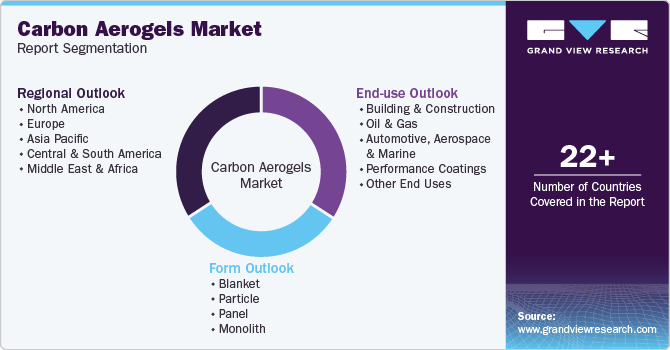
-
Form Outlook (Revenue, USD Million; 2018 - 2030)
-
Blanket
-
Particle
-
Panel
-
Monolith
-
-
End-use Outlook (Revenue, USD Million; 2018 - 2030)
-
Building & Construction
-
Oil & Gas
-
Automotive, Aerospace & Marine
-
Performance Coatings
-
Other End Uses
-
-
Regional Outlook (Revenue, USD Million; 2018 - 2030)
-
North America
-
U.S.
-
Canada
-
Mexico
-
-
Europe
-
Germany
-
UK
-
France
-
Spain
-
Italy
-
-
Asia Pacific
-
China
-
India
-
Japan
-
South Korea
-
-
Central & South America
-
Middle East & Africa
-
Frequently Asked Questions About This Report
b. The global carbon aerogels market size was estimated at USD 105.0 million in 2024 and is expected to reach USD 124.6 million in 2025.
b. The global carbon aerogels market is expected to grow at a compound annual growth rate of 20.2% from 2025 to 2030 to reach USD 312.3 million by 2030.
b. The blanket segment led the market and accounted for the largest revenue share of 57.53% in 2024, driven by its superior thermal insulation, lightweight properties, and flexibility.
b. Some of the key players operating in the carbon aerogels market include Aerogel Technologies, American Elements, Green Earth Aerogel Technologies (GEAT), Cabot Corporation, Aspen Aerogels, and Nanolit
b. The key factors that are driving the carbon aerogels market include the growing demand for lightweight, high-performance materials in industries such as aerospace, automotive, electronics, and energy, along with advancements in nanotechnology and increasing focus on energy efficiency and thermal management solutions.
Share this report with your colleague or friend.
Need a Tailored Report?
Customize this report to your needs — add regions, segments, or data points, with 20% free customization.

ISO 9001:2015 & 27001:2022 Certified
We are GDPR and CCPA compliant! Your transaction & personal information is safe and secure. For more details, please read our privacy policy.
Trusted market insights - try a free sample
See how our reports are structured and why industry leaders rely on Grand View Research. Get a free sample or ask us to tailor this report to your needs.










